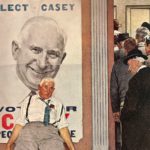Wichita, KS
I just returned from my near-annual pilgrimage to the American Political Science Association’s annual convention…this year held, ironically enough, in Toronto, Ontario, Canada. I didn’t mind–it meant I’d be able to see some friends whom I haven’t talked with in years. But the conference did strike me oddly, and perhaps revealingly, in at least one important way. I’ve written up some longer thoughts here, but this is the gist of what I came home feeling:
Political scientists–and in particular the political theorists with whom I spend most of my time, and the theoretical debates I’m most interested in following–are hardly the most expert and reliable barometers of the directions in which our shared (or at least observed) political culture may happen to be evolving at any one time. Still, it somewhat surprised me, to find that in all sorts of ways, it seemed to me that everyone was talking about, or at least opening the door to, the limits of, or the problems with, sovereignty, and centralized power, and the state.
Jacob Levy, in giving the best paper presentation I heard the whole conference (but then Jacob always gives great presentations), attacked the idea that modern liberal democracies, premised upon a social contract ideology, somehow escape the subtle moral teleology which is usually seen as fundamentally characterizing pre-modern political forms…which opens to the door to the argument that the only way to avoid investing political organizations with unwarranted normative presumptions is to look towards non-political forms of social organization entirely. In a couple of presentations given by my philosophical hero, Charles Taylor, one as part of a roundtable on his report on accommodating minority differences in Quebec, the other on different ways of responding to religious claims in a liberal and pluralistic context, he repeatedly emphasized that the practical response to all of the contesting and conflicting demands free people have must be expressed locally, that principled and over-arching and contextless legal determinations–at least beyond an absolute bare liberal minimum–will almost always be counter-productive, and that, in the end, these kind of arguments must lead towards the question of decentralization, and a critique of the moder juridical state. In a couple of workshops on comparative political theory (a continuing interest of mine), and even in a couple of panels I attended addressing thinkers and conceptual categories from contexts as diverse as ancient China and contemporary Eastern Europe, repeatedly harsh questions about economic globalization and state sovereignty emerged, and names like Herman Daly, E.F. Schumacher, and John Milbank were tossed about. The late G.A. Cohen’s just released and, presumably, final book, Why Not Socialism? (nicely introduced and discussed in this Crooked Timber thread here), makes one of the best cases for essential socialist principles that I’ve ever read…and then quite plainly admits that, despite continued experimentation, we yet have no idea how to actually institute those principles on any basis much larger than a group of friends going camping. James C. Scott, he of the extremely insightful Seeing Like a State, has just come out with a huge, meticulously detailed volume, The Art of Not Being Governed, making an “anarchist” case for the non-state organizations by which millions of Zomia peoples (a collective terms for the upland inhabitants of Vietnam, Laos, Cambodia, Burma, and south China) traditionally resisted state-builders both capitalist and communist. All of that, plus the conversation I overheard between a couple of political scientist bigwigs, discussing how the fundamental problem with all of the very good, very persuasive, and very true arguments which President Obama’s people have put forward about how much more efficient and effective the delivery and funding of health care is in just about every other industrialized nation on the planet, is the simple fact that all of those nations which advocates of health care reform–like myself!–refer to have smaller populations, and smaller economies, than does ours…which makes all comparisons, however worth making, slightly hard to take seriously.
Well, I don’t know–it’s all probably more a matter of my own interests and concerns than anything else. And it’s not like all that is anything like a representative sample of the tens of thousands of conversations taking place Wednesday through Sunday at the Toronto Convention Centre. And even it is was, it’d only be, as I said, at best just some stray tea leaves looking for an interpretation. Still, for whatever it’s worth, if political scientists are any kind of canary in a coal mine, I can’t help but wonder if the lurking issue that may suddenly emerge to shape political thinking in the near future might simply be a sense that, well, enough is enough: that politics–state politics, national politics, to say nothing of international politics–claim too much, and try to do and to mean, too much. An awareness of the need to balance state and market imperatives with local humility, perhaps? That’s not a bad lesson to learn, if it turns out that anyone really is teaching such a lesson at all.






5 comments
Bob Cheeks
Someday I’m goin’ so I’ll buy you an adult beverage or two. I’m reading Dr. Walsh’s latest and just blown away by his seminal thinking and scholarship which if it isn’t as high as EV is awfully close. I am a fan but won’t finish this book until deep in the winter and I’m obliged to review it.
BTW do they do ‘panels’ on FWC Schelling? And, I hope you’re not spending too much time on the Marx panels!
Russell Arben Fox
I’m afraid not, Bob. I used to attend the Voegelin panels soon after I graduated from Catholic U., since David Walsh–one of my teachers there–is such a major figure in that scholarship. But Voegelin has never been an area of concentration of mine, and I gradually stopped participating there, as I just wasn’t keeping up on that reading sufficient to make the discussions worth my time. A loss, to be sure, but there’s so much to see and hear and learn from at the conference that you have to make choices.
Bob Cheeks
Did you or any of your pals sit in on any of the E. Voegelin papers?
Comments are closed.